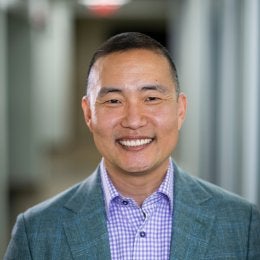Richard Q. Shin is an associate professor in the Counseling, Higher Education, and Special Education (CHSE) department in the College of Education at the University of Maryland, College Park. He is a faculty member of the Counseling Psychology Program and coordinates the School Counseling Masters Program. Dr. Shin joined the CHSE department at UMD during the 2012-2013 academic year after spending seven years as a faculty member in the School of Education at Syracuse University.
His research interests include the identification of academic resiliency factors among youth of color living in underresourced neighborhoods, including the need to disrupt dominant deficit oriented societal narratives about this devalued and marginalized population. Further, his research focuses on the ways in which heterosexual identifying individuals of color define and make sense of their intersecting social identities. The purpose of this research is to create more nuanced approaches to improving counseling services for lesbian, gay, bisexual, transgender, and queer clients. Dr. Shin is also initiating a "blind" audit study intended to assess racially biased call back patterns among practicing counseling professionals.
Professionally, Dr. Shin serves as the Finance Officer of the Asian American Psychological Association. He serves on the Editorial Board of the Journal of Counseling Psychology and has previously served on the Editorial Boards of Counselor Education and Supervision and the Journal of Multicultural Counseling and Development.
Peer Reviewed Journal Articles
Shin, R., Welch, J., C., Kaya, A. E., Yeung, J. G., & Obana, C. A. (under revision). The Intersectionality Framework and Identity Intersections in the Journal of Counseling Psychology and The Counseling Psychologist: A Content Analysis. Manuscript submitted to the Journal of Counseling Psychology.
Shin, R. Q., Smith, L. C., Welch, I., & Ezeofor, I. (in press). Is Allison more likely than Lakisha to get a call back from counseling professionals: A racism audit study. The Counseling Psychologist.
Shin, R. Q., Ezeofor, I., Smith, L. C., & Welch, J. C. (2016). The development and initial validation of the contemporary critical consciousness measure. Journal of Counseling Psychology, 63(2), 210-223.
Smith, L. C. & Shin, R. (2015). Negotiating the intersection of racial oppression and heteronormativity. Journal of Homosexuality, 62, 1459-1484.
Smith, L. C. & Shin, R. (2014). Queer blindfolding: Difference “blindness” towards persons who identify as lesbian, gay, bisexual and transgender. Journal of Homosexuality, 61, 940-961.
Smith, L. C., & Shin, R. Q. (2012). Moving counseling forward on LGBT Issues: Speaking queerly on discourses and microaggressions. The Counseling Psychologist, 40(3), 385-408.
Shin, R. Q. (2011). The influence of Africentric values and neighborhood satisfaction on the academic self-efficacy beliefs of African American elementary school children. Journal of Multicultural Counseling and Development, 39(4), 218-228.
Shin, R. Q., Smith, L. C., Goodrich, K. M., & LaRosa, N. (2011). Attending to diversity representation among CACREP master’s programs: A pilot study. International Journal for the Advancement of Counselling, 33(2), 113-126.
Goodrich, K. M., Shin, R. Q., & Smith L. M. (2011). The doctorate in counselor education: Peeling back the curtain. International Journal for the Advancement of Counselling, 33, 184-195.
Shin, R. Q., Morgan, M. L., Buhin, L., Truitt, T. J., & Vera, E. M. (2010). Expanding the discourse on urban youth of color. Cultural Diversity and Ethnic Minority Psychology, 16(3), 421-426.
Shin, R. Q., Rogers, J., Silas, M., Smythe-Brown, C. Stanciu, A., Austin, B. (2010). Advancing social justice in urban schools through the implementation of transformative groups for youth of color. The Journal for Specialists in Group Work, 35(3), 230-235.
Daly, B. P., Shin, R. Q., Thakral, C., Selders, M., & Vera, E. M. (2009). School engagement among urban adolescents of color: Does perception of social support and neighborhood safety really matter? The Journal of Youth and Adolescence, 38(1), 63-74.
Shin, R. Q. (2008). Advocating for social justice in academia through recruitment, retention, admissions, and professional survival. The Journal of Multicultural Counseling and Development, 36(3), 180-192.
Smith, L. C., & Shin, R. Q. (2008). Social privilege, social justice, and group counseling: An inquiry. The Journal for Specialists in Group Work, 33(4), 351-366.
Shin, R. Q., Daly, B. P., & Vera, E. M. (2007). The relationships of peer norms, ethnic identity, and peer support to school engagement in urban youth. Professional School Counseling, 10(4), 379-388.
Vera, E. M., & Shin, R. Q. (2006). Promoting strengths in a socially toxic world: Supporting resiliency with systemic interventions. The Counseling Psychologist, 34(1), 80-89.
Vera, E. M., Shin, R. Q., Montgomery, G., Mildner, C., & Speight, S. (2004). Conflict resolution, self-efficacy, self-control and future orientation of urban adolescents. Professional School Counseling, 8, 73-80.
Book Chapters
Shin, R. Q. (2015). The application of critical consciousness and intersectionality as tools for de-colonizing racial/ethnic identity development models in the fields of counseling and psychology. In R. Goodman & P. Gorski (Eds.). Decolonizing “Multicultural” Counseling and Psychology: Visions for Social Justice Theory and Practice (pp.11-22). New York: Springer SBM Publications.
Shin, R. Q., & Kendall, M. (2012). Dropout prevention: A (re)conceptualization through the lens of social justice. In E. Vera (Ed.). The Oxford Handbook of Prevention in Counseling Psychology (pp. 213-225). New York: Oxford University Press.
Vera, E. M., Buhin, L., & Shin, R. Q. (2005). The pursuit of social justice and the elimination of racism. In D. Sue & M. Constantine (Eds.). Addressing Racism: Facilitating Cultural Competence in Mental Health and Educational Settings. New York: Wiley & Sons.
